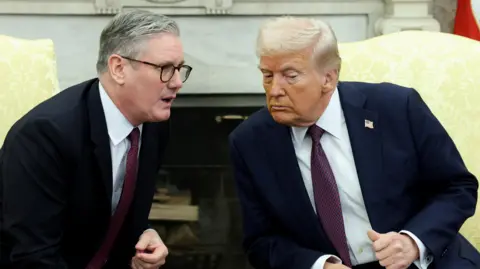Chris Mason: UK's position on Iran is clear but will the US listen?
 Reuters
ReutersThe prime minister has spoken to President Trump in the aftermath of America's attacks on Iran.
But, in the end, the call beforehand demanding a yes or no answer didn't come.
That is not to say it might not in the days and weeks to come.
The British government is making it known that while it was told in advance what Washington was about to do, it didn't take part and wasn't asked to.
And so there wasn't a call from President Trump asking the prime minister whether the UK would be involved, for instance via authorising US warplanes to use the UK military base at on Diego Garcia in the Indian Ocean.
Having repeatedly pressed publicly for "de-escalation" as Sir Keir Starmer puts it, and questions seemingly being raised privately within government about the legality of getting involved, saying yes to a request for help from the White House might have been difficult.
But saying no would have been difficult too, after months of assiduous effort put into developing a good relationship with President Trump.
Washington acting alone and choosing to send its planes direct from America meant that massive, binary decision from Sir Keir wasn't needed.
But, depending if, how and when Iran chooses to retaliate, some of these trade-offs could soon return.
For now, though, how should the UK's approach be assessed?
In short, the government wills the ends America is pursuing, but is conspicuously not endorsing the means.
In other words, it doesn't want a nuclear armed Iran.
But neither is it saying it supports Washington's means of trying to remove that outcome - bombing Tehran's nuclear facilities.
The Conservatives see this as equivocation and "moral cowardice".
On Friday, the Foreign Secretary David Lammy, alongside France, Germany and the European Union, met Iran's Foreign Minister in Geneva, Switzerland - but President Trump was publicly dismissive of these efforts.
A day or so later, and the attacks began.
As they did, the US Secretary of State Marco Rubio spoke to Lammy by phone.
They had met a few days earlier in Washington.
The foreign secretary has again spoken to his Iranian opposite number Abbas Araghchi.
The UK is encouraging Iran to talk directly to the US.
Iran has been making it clear for days that it won't talk to America while it is being hit by the Israelis.
And Lammy has also spoken to the Israeli Foreign Minister Gideon Sa'ar, pressing the case for a diplomatic solution and to the foreign ministers of Egypt and Cyprus - and then spoke again to Rubio.
The UK position, for now at least, is clear - the government believes a diplomatic solution from here on in is the best way to secure an Iran free of nuclear weapons into the long term.
But America chose not to listen to this argument from London, Paris, Berlin and elsewhere before its air strikes.
The question is whether it will now they have happened.
We can expect a minister, probably the foreign secretary, to face questions on all this in the Commons on Monday afternoon.
And on Tuesday the prime minister, President Trump and plenty of other Western leaders will gather in the Netherlands for the annual summit of the Nato military alliance. They will have plenty to discuss.

Sign up for our Politics Essential newsletter to read top political analysis, gain insight from across the UK and stay up to speed with the big moments. It'll be delivered straight to your inbox every weekday.
